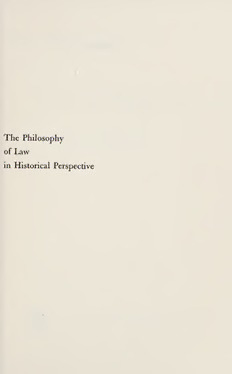
The Philosophy of Law in Historical Perspective PDF
Preview The Philosophy of Law in Historical Perspective
The Philosophy of Law in Historical Perspective The Philosophy of Law in Historical Perspective SECOND EDITION By Carl Joachim Friedrich THE UNIVERSITY OF CHICAGO PRESS Hi so FISH Library of Congress Catalog Number: 57-9546 The University of Chicago Press, Chicago & London The University of Toronto Press, Toronto 5, Canada © 1958, 1963 by The University of Chicago. Published 1958. Second Edition 1963. First Impression 1963. Com¬ posed and printed by The University of Chicago Press, Chicago, Illinois, U.S.A. ONULP TO A. N. HOLCOMBE IN FRIENDSHIP ERROR MULTIPLEX, VERITAS UNA 002623 \ X fc-: * ? fjK.. . i -'Js: / , • ■ .1 'h/,' ■.* \ ^v, ./- Preface to the Second Edition The present edition contains a few corrections as well as additions, notably on pages 7, 49, 64, 119, 129, 166, 173, 175, 176, 182, and 219, that were suggested by the many helpful reviews that have appeared in learned journals. I would like to add that, in view of my general outlook on law and history, the second part does not pretend to be a rounded philosophy of law, nor is it an outline; it merely seeks to highlight certain problems which seem to me to be in the foreground today, while many others which are also being discussed have received more or less satisfactory treatment in the past. One criticism has often been made, and that is that the con¬ tributions of contemporary American jurisprudence, particularly the work of so-called realism, have not been given adequate space. I would plead that a treatment which provides a total of fourteen pages for Plato and Aristotle did rather well by contemporary relativists, formalists, and skeptics in assigning the same amount of space. However, I have added a couple of paragraphs and have included a review article which appeared in the thirties and which contains some of my major doubts about this approach to the philosophy of law. I have also included a paper on “Law and His¬ tory” which was prepared for a conference on law and the humani¬ ties under the auspices of the American Council of Learned Soci¬ eties in 1960 and which has since appeared in the Vanderbilt Law Review, October, 1961. Some critics stress the fact that I did not go into the political and social realities behind law in extenso. Quite apart from the fact that the editorially imposed limitations of space forbade such ex¬ ploration, it seemed to me that my other writings provided con¬ siderable evidence of my views. Since 1 am publishing a compre¬ hensive political theory this year, I hope I may be forgiven for referring to that work as a companion volume to the present study. vii Preface to the Second Edition In conclusion, I would like to mention that I do not consider myself a Kantian or a neo-Kantian since I am in basic disagree¬ ment with Kant’s distinction between noumena and phenomena, of norm and fact, which is such a crucial aspect of most contem¬ porary legal philosophy, including the so-called pure law and realist schools. Rather do I incline toward the view that ultimately norm and fact are aspects of the same reality revealed and known to us only through human experience. This is a point of view which makes me feel akin to Aristotle and Thomas Aquinas, on the one hand, and to the most advanced thinking on the nature of reality in contemporary science, on the other hand. Cambridge, Massachusetts January 30,1963 via Preface to the First Edition This brief volume is an effort to discuss the problems of the philosophy of law, as they present themselves today, within the framework of its history. Such an enterprise presupposes that one is willing to select very carefully among the mass of available materials and viewpoints. Inevitably, one will be influenced in making such a selection by what he considers important to the discussion for our time. Much that is interesting must necessarily remain undiscussed. I have tried to use as a measuring rod and standard of selection the relatively objective one provided by the originality of the different contributions. There is one exception, namely, the natural-law writers of the seventeenth and eighteenth century discussed in chapter xiii; their originality is disputable indeed. This book is an English version of Die Philosophic des Rechts in historischer Perspektive, which appeared as one of the volumes of the “Enzyklopadie der Rechts- und Staatswissenschaft,” under the editorship of Professor Wolfgang Kunkel (Munich). I am very grateful for his encouragement and helpful advice. While this English edition in large part follows the German original, there are also significant variations and additions, especially in chapters xi, xx-xxiv, and the notes. The notes make no pretense at com¬ pleteness, obviously; they merely seek to give some hints as to the sources of some of the more important statements made in the text. The English text was read and criticized in its entirety by Professor A. P. d’Entreves (Oxford and Turin) and by Professor Samuel Shuman (Wayne University). The comments of both were of very great assistance, as were the observations of a num¬ ber of European critics and reviewers. Dr. Henry Kissinger (Har¬ vard) had at an earlier date offered valuable comments on the German manuscript. C. J. F. ix
